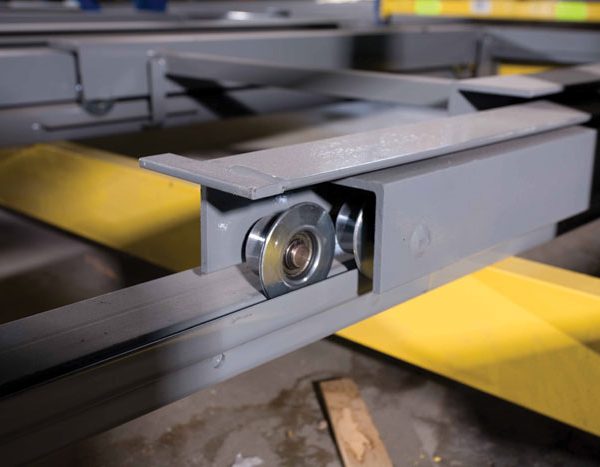PUSH BACK PALLET RACK
Higher Density Coupled with Speed and Efficiency
Pushback racking is a type of dynamic pallet storage system that allows palletized product to be stored on both sides of an aisle, providing a higher density storage solution than other pallet rack systems. Pushback rack is typically constructed using roll formed or structural pallet rack with rail sections inclined down towards the pick face that extend the full depth of the storage lane (typically 2-6 pallets deep) and operate using the force of gravity. There are a series of nested carts that pallets rest on top of that roll on the rail system, often constructed from C channel or steel tube. When the first pallet is loaded from the pick face, it sits on the first and topmost cart in the lane. When the second pallet is loaded, the first pallet is “pushed back” behind it one position along with any pallets that are behind it, exposing the cart or rail underneath. The second pallet is then either placed on the rail in a two deep system or placed on the next cart in a 3-6 deep system. This process continues until the lane is full, up to six pallets deep. To remove a pallet, the fork truck driver lifts the pallet off, reverses slowly and the next pallet slides forward and into the front position. This operation is repeated until the lane is empty. Essential to note, with pushback rack, the forklift acts as the braking system, controlling the speed at which the next pallet in the series moves toward the pick face.
Safer Storage Solution Built Tough
Pallet rack cart and rail push back systems offer many advantages over the more common selective pallet rack found in most warehouses. Pushback is often utilized as a LIFO (Last-in, First-out) system, providing better selectivity than other high-density storage systems yet still allowing for multiple pallets of the same SKU. Many in the industry recognize pushback as a “best of both worlds” solution to their storage needs. Fewer aisle counts are required in a pushback system, contributing to density, and reducing overall footprint. Unlike drive-in rack, forklifts do not have to enter racking structures, affording fewer chances for accidents, damage, and injury. Pushback rack also minimizes honeycombing, keeping time and labor costs down as compared to standard selective pallet rack. Additionally, many non-standard pallet sizes can be accommodated due to the extra support provided.
Structural steel is the medium of choice when constructing cantilever racking systems. Roll formed steel cantilever requires a greater amount of labor to make, holds less weight, and is more susceptible to corrosion, especially when used in an outdoor application. This is what makes Hannibal Industries a leader in the field. With years of experience in structural steel, Hannibal has not only the know-how but the manufacturing capacity and engineering background to tackle any job requirements with products built to last. With value-engineered designs for an ideal configuration specific to customer needs and storage space, Hannibal’s cantilever racks maximize space both vertically and horizontally to provide an economical, efficient storage and retrieval system. In addition, all-structural steel fabrication ensures a long life for your storage investment.
Railed Racks Save Cooler Space
Many industries are well suited to utilizing pushback racking systems. It is used extensively in grocery, cold storage, consumer packaged goods, food manufacturing and distribution, beverage, third party logistics facilities, automotive, pharmaceuticals, and other industries where there are high pallet counts, mid-level SKU counts and a need to densify. Pushback is quite popular in high seismic areas, as the design allows for high lateral storage without requiring the need for large vertical climb. While often used as a LIFO system, pushback can be utilized as a FIFO system as well, upping its versatility for operations with lower product turnover rates.
Smart Design Makes the Most of Your Warehouse
Hannibal Industries has a great partner in Conveyor & Storage Solutions when it comes to pushback rack. C&SS is renowned in the material handling industry as density experts, with a common tool being Hannibal Pushback Systems. Careful attention to engineering, design, and industry specific end-user goals result again and again in durable, reliable systems that simply work. With decades of experience and a newly titled Hannibal Master Dealer, C&SS is uniquely positioned to help any business grow their warehouse capacity and increase density with a pushback racking system.

